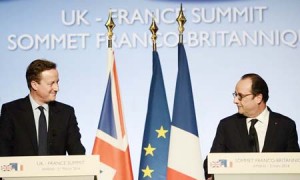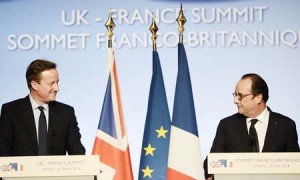The Guardian
Martin Kettle
 Geography has always had as much to do with international affairs as economics or ideology ever have. So perhaps it is the symbolism of being a staging post on the old route between London and Paris that explains why Amiens is a place where Britain and France – so often economic and ideological rivals – meet and do deals. When the British and French leaders meet in the northern French town, as they did on Thursday, practical politics always seems likely to win out over even the deepest ancestral suspicions. That was certainly the case when the two countries signed their compromise peace treaty in Amiens in March 1802, in which Henry Addington’s British government bowed the knee to Napoleon’s European conquests in the hope that economic prosperity and commerce would revive. In fact, the deal only lasted a year because Napoleon – incapable of banking his gains – always wanted more.France and Britain have not fought a major war since Napoleon’s fall. But they frequently still look askance at one another’s actions and motives on the world stage. Nevertheless, a 21st-century version of solid Anglo-French pragmatism was on show again in Amiens yesterday, when David Cameron and François Hollande met to proclaim the stabilising importance of the Anglo-French alliance within an enduring European Union in which both sides want Britain to remain.
Geography has always had as much to do with international affairs as economics or ideology ever have. So perhaps it is the symbolism of being a staging post on the old route between London and Paris that explains why Amiens is a place where Britain and France – so often economic and ideological rivals – meet and do deals. When the British and French leaders meet in the northern French town, as they did on Thursday, practical politics always seems likely to win out over even the deepest ancestral suspicions. That was certainly the case when the two countries signed their compromise peace treaty in Amiens in March 1802, in which Henry Addington’s British government bowed the knee to Napoleon’s European conquests in the hope that economic prosperity and commerce would revive. In fact, the deal only lasted a year because Napoleon – incapable of banking his gains – always wanted more.France and Britain have not fought a major war since Napoleon’s fall. But they frequently still look askance at one another’s actions and motives on the world stage. Nevertheless, a 21st-century version of solid Anglo-French pragmatism was on show again in Amiens yesterday, when David Cameron and François Hollande met to proclaim the stabilising importance of the Anglo-French alliance within an enduring European Union in which both sides want Britain to remain.
These summits take place so regularly these days that it is tempting to dismiss them as largely decorative. But yesterday’s was significant. It has already become one of the cliches of the Brexit debate that Germany and France are desperate for Britain to remain in the EU, to provide a stability whose absence might otherwise send the union spinning off into wider instability. What is not said enough is how remarkable a turn of events this really is, especially in the case of France.Ever since British exit from Europe became a realistic possibility, there has never been any doubt that Germany would be a pivotal player in the negotiations leading up to any deal; or that Angela Merkel might even play a significant role at some stage in the referendum campaign. Merkel has many problems – not least the migration crisis and difficult regional elections later this month – but it would be surprising if the chancellor did not make an intervention in the Brexit debate before it is over. If she does, few would dispute that she will get a serious hearing.
Hollande’s France, though, has been another matter. From almost every point of view the French president might seem an improbable partner for David Cameron’s efforts to win the vote in June. As a socialist politician in an era of centre-right ascendancy, as a believer in state action in an era of neoliberalism, and eclipsed by Merkel at the heart of an EU of which France and Germany were for so long joint leaders, Hollande might seem to have little to offer Britain’s complacent and careless prime minister. It wasn’t so long ago that no one in the British government had a kind word to say for the French president or his policies at all. Hollande was seen in London as a man presiding over a failed economic model and to be suffering the electoral consequences of his own weaknesses. At the G20 summit in 2012 Cameron openly mocked French tax policies, causing great offence in France.
Back then, the idea that Hollande might be treated during the referendum campaign as an ally almost on the level of Merkel or Barack Obama (who is coming to Britain to make his opposition to Brexit clear, perhaps next month) would have been for the birds.
True, even now Hollande is the least likely of the three major leaders to have much impact on the British public’s thinking about Europe. But he is important because France is important. And there was no mistaking the devotion to one another’s cause in the run up to the Amiens meeting, with Cameron calling Britain and France “proud allies”, and with the two leaders due to announce a joint deal on drone development which underlines the core reality that Britain and France remain Europe’s two leading players in defence and international security.



